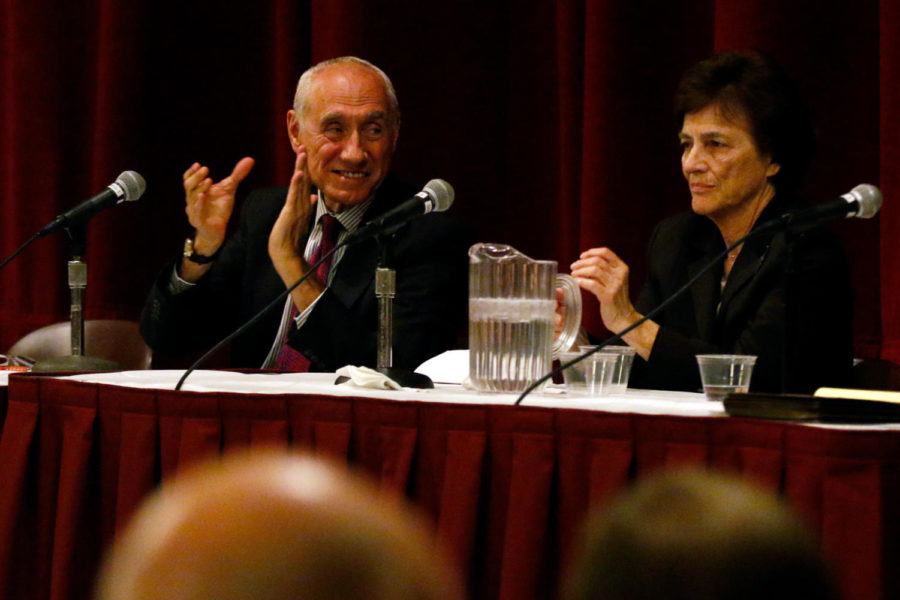Former U.S. representatives reflect on lessons from Watergate, 40 years later
Former U.S. Reps. Edward Mezvinsky, left, who represented Iowa’s 1st District, and Elizabeth Holtzman, of New York, discuss the results and lessons learned from the Watergate scandal.
October 18, 2013
In 1972, five burglars were arrested for breaking into the Democratic National Headquarters in Washington.
The break in, which eventually would be traced back to the White House, led to President Richard Nixon’s resignation in 1974 and remains the only instance in American history that a president has resigned.
On Thursday, Edward Mezvinsky and Elizabeth Holtzman, who both served on the House Judiciary Committee during the scandal, and Jonathan Yarowsky, who served as general counsel for the same committee in the 1980s and 1990s, led a panel discussion on “Watergate Forty Years Later: What Lessons Have We Learned?”
“I heard those tapes, and I became enraged,” Mezvinsky said. “I became enraged how people were not thinking about our country.”
Mezvinsky said he was elected at the time Watergate was breaking. He grew up in Ames.
Before the discussion began, the audience of about 350 people watched a 10-minute “Reflections on Watergate” video, in which two of the panelists were featured. The personal reflections of each panelist followed.
Holtzman began by recounting the entire series of events, from the break-in, to the Saturday Night Massacre, to the Supreme Court ruling Nixon would have to turn over the “smoking gun” tape and all the way through to the impeachment process.
Holtzman said she credited the courts for being the first to respond by giving the burglars tough sentences in the hopes one of them would cave.
Holtzman was a new member of the House Judiciary Committee at the time. She said in the video that she probably would not have been assigned the position had anyone realized the question of whether or not the president should be impeached would come up precisely because she was so new.
“People who end up on that committee end up making big decisions,” said Yarowsky, whose time on the committee came after Watergate.
The panelists were prompted to recount their most vivid memories of the scandal and were asked what lessons should have been learned from
Watergate.
“After 40 years, we appear to have forgotten the critical lessons of Watergate,” Holtzman said.
She compared the presidential abuse of power of Nixon’s era to more recent presidents, including George W. Bush and incidents involving waterboarding.
Josephine Nguyen, senior in event management, helped in the planning of the event. She said she had to do a lot of personal research beforehand.
“[The lecture] was really informational,” Nguyen said.
She said she had been helping plan the event since August.
The reflections of the panelists were followed by a question and answer session.
Prior to Thursday’s panel discussion, Mezvinsky turned over a collection of his congressional papers to Iowa State, including the ones regarding Watergate.
“It was probably Congress’s finest hours in many ways,” Mezvinsky said about the Watergate scandal.

















